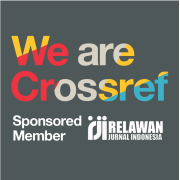THE IMPLEMENTATION OF HUMAN FREEDOM THEORY IN EARLY EDUCATION
Abstract
Early childhood education is now an obligation to prepare children for further education. Education in primary schools has levels that must be taken first with the aim that the child is ready to attend lessons first, such as education in kindergarten and early childhood education. This study aims to look at human freedom in undergoing early childhood education and the values contained in education. The theory of freedom is used to examine the harmony between the spirit of preparing for education with the pure value of human freedom, so that it can be said that early childhood education is a freedom. The method used in this research is descriptive qualitative. Data analysis was carried out in a holistic manner to achieve an exploration of the theory of freedom contained in early childhood education. The results of this study prove that early childhood education can be said that the implementation of freedom will support the true free human being, that is, free from ignorance and backwardness.
Full Text:
PDFReferences
Bakker, A. (2000). Antropologi Metafisik. Yogyakarta: Kanisius.
Barlas, A. (2003). Cara Quran Membebaskan Perempuan. diterjemahkan oleh R, Cecep Luqman Yasin. Believing Women in Islam. Jakarta: Serambi Ilmu Semesta.
Bertens, K. (2000). Etika. Jakarta: Gramedia Pustaka.
Budlender, D. et.all. (2002). Gender Budgets Make Cents: Understanding Gender Responsive Budgets. London: Commonwealth Secretariat
Colombo, M. (2012). Pluralism in Education and the multicultural reality of the schools.How do Italian teachers react?. Sociology of Education Research Network, SOE-RN 10 European. Sociological Association Mid-term conference, Department of Sociology, Ghent University, Belgium, 13th and 14th of September 2012.
Dister, N. S. (1998). Filsafat Kebebasan. Yogyakarta: Kanisius.
Fakih, M. (1996). Analisis Gender dan Transformasi Sosial. Yogyakarta: Pustaka Pelajar.
Husein, A. R. (1995). Hak Anak dalam Islam. Jakarta: Fikahati Aneska.
Irianto & Sulistyowati. (2008). Perempuan dan Hukum “Menuju Hukum yang Berperspektif Kesetaraan dan Keadilan, Jakarta: Yayasan Obor Indonesia.
Kadarusman. (2005). Agama, Relasi Gender dan Feminisme. Yogyakarta: Kreasi Wacana.
Leahy, L. (1993). Manusia Sebuah Misteri. Jakarta: Gramedia.
Mill, J. S. (2005). On Liberty: Perihal Kebebasan. Jakarta Yayasan Obor: Indonesia.
Moleong, Lexy J. (2007). Metodologi Penelitian Kualitatif. Bandung: PT. Remaja Rosdakarya.
Morrison, G. S. (2012). Dasar-dasar Pendidikan Anak Usia Dini. Jakarta: PT Indeks.
Mpofu, Elias, Thomas, Kenneth R. & Chan, Fong. (2004). Social competence in Zimbabwean multicultural schools: Effects of ethnic and gender differences, International Journal of Psychology, 39 (3).
Mufidah. (2008). Psikologi Keluarga Islam Berwawasan Gender. Malang: UIN-MALANG PRESS.
Nirmalasari, N. (2020). Stunting Pada Anak: Penyebab Dan Faktor Risiko Stunting di Indonesia. QAWWAM, 14(1), 19-28.
Russel, B. (1993). Pendidikan dan Tatanan Sosial. Jakarta: Yayasan Obor Indonesia.
Subhan, Z. (2006). Kekerasan Terhadap Perempuan. Yogyakarta: LKiS.
Sugiarti & Trisakti, H. (2003). Konsep dan Teknik Penelitian Gender. Malang: UMM Press.
Suseno, F. M. (1997). 13 Tokoh Etika. Yogyakarta: Kanisius.
Watt, W. Montgomery. (1968). Islamic Political Thought. North America: Edingburgh University Press.
Yus, A. (2011). Model Pendidikan Anak Usia Dini. Jakarta: Kencana.
DOI: http://dx.doi.org/10.31958/agenda.v3i1.2597
Refbacks
- There are currently no refbacks.
Copyright (c) 2021 Zainal Fadri

This work is licensed under a Creative Commons Attribution-NonCommercial 4.0 International License.

AGENDA: Jurnal Analisis Gender dan Agama distribute under Lisensi Creative Commons Atribusi-NonKomersial 4.0 Internasional
























